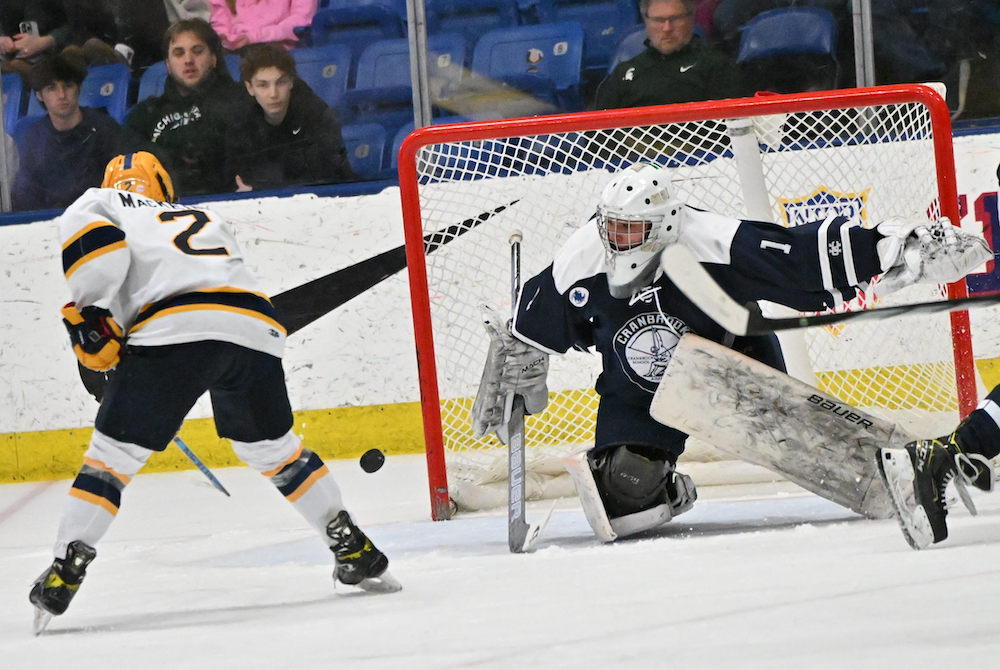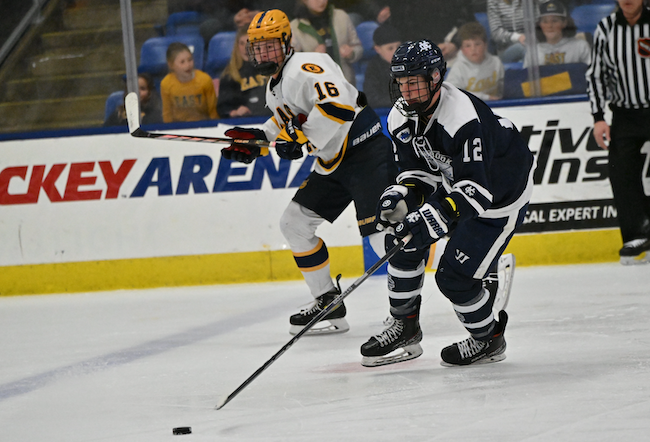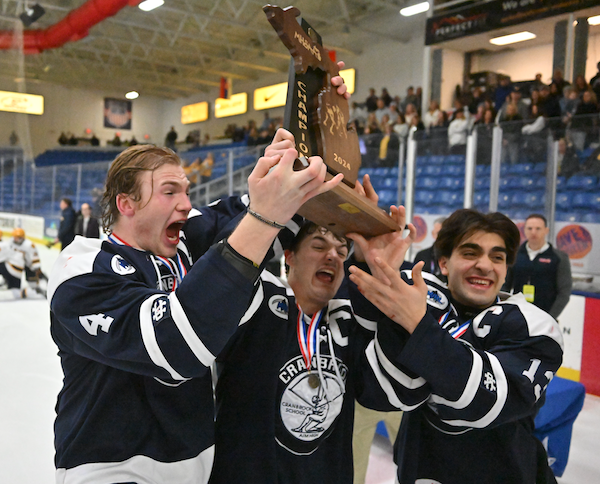
Powerful Voice for High School Sports
December 19, 2014
By Geoff Kimmerly
Second Half editor
Paul Carey was home from the U.S. Army only a few months and just shy of 25 years old when Beal City embarked on its first trip deep into the MHSAA boys basketball tournament.
On the call for local radio station WCEN from gyms at Saginaw Arthur Hill and Lansing Sexton, Carey served as the voice of the previously “laughable” Aggies as they reached the Class D Semifinals before falling just six points short of playing for the title.
“All of Beal City emptied out. They’d never had anything before,” Carey recalled during his annual Thanksgiving weekend visit to the MHSAA Football Finals at Ford Field. “When I got home, within the next two weeks I got a letter from every citizen of Beal City thanking me for broadcasting their games. That’s the kind of appreciation that meant so much.”
During 42 years on the airwaves, Carey was best known as a voice of the Detroit Tigers bounding out of transistor radios all over Michigan, thanks to WJR’s powerful signal.
But for the state’s high school sports community, his legacy is similarly memorable as the voice of the longtime football and basketball scoreboard show and a voter for various all-state teams and wire polls over the decades.
Now 86 and retired since 1991, Carey remains a regular during the first day of the Football Finals, taking in games he broadcast for the MHSAA during the late 1970s and that continue to hold his eye as they have for more than a half-century.
“It was a passion of mine. High school sports always has been,” Carey said. “I think because my dad was a high school coach, and teacher initially, and my brother was a high school coach and teacher, I just grew up in families that appreciated coaching and athletics. I was not a great athlete, but it kept my hand in following sports that way.”
Now, the scores
Carey partnered with Ernie Harwell for Tigers radio broadcasts from 1973-91, including during the march to the 1984 World Series championship. He was named Michigan Sportscaster of the Year six times and to the Michigan Sports Hall of Fame in 1992.
But Carey’s early career included sitting on top of a car, plugged into a phone pole, for a Sacred Heart football game at old Fancher Field just a few blocks from his family’s Mount Pleasant home. Among many more accolades are a Distinguished Service Award from the Michigan High School Coaches Association and a place in the Basketball Coaches Association of Michigan Hall of Fame.
In fact, the start of his weekly announcing of statewide football and basketball scores preceded his baseball career by 16 years and ended two months after he announced his final professional out.
The Michigan High School Scoreboard show was a staple of WJR’s late Friday nights from 1957-91. Carey would read every score he could collect from a variety of sources, often organized by league and with state rankings and context mixed in.
His idea came from something similar read by Len Colby for Kalamazoo’s WKZO. Carey’s brother Terry was coaching at Niles during the second half of the 1950s, and he and other coaches would get together to listen to the Friday night scores from the southwestern part of the state.
Carey, who left WKNX in Saginaw for WJR in 1956, explained to then-sports director Bob Reynolds that the station’s strong signal could provide for a truly statewide scoreboard experience.
Carey then connected with Edgar Hayes of the former Detroit Times, who gave the OK for Carey to call the paper on Friday nights to get scores from the Detroit metro area. For the rest, Carey relied on wire services – there were three at the time – who relied on newspapers from all over Michigan to call in scores over the course of an evening.
Before every Friday during high school football season – and later Tuesdays and Fridays during boys basketball season – Carey typed up lists of games based on schedules in the newspaper, with spaces to add scores. More than a few times, Carey raced down a back ramp at Tiger Stadium after a Friday night game, back to the WJR studio, with 15 minutes to prep for the show’s 11:30 p.m. start.
“If the Flint Journal, the Grand Rapids Press, the Traverse City paper didn’t call in scores to the AP, then I was out of luck too. And that happened all the time,” Carey said. “I would call back occasionally, say, ‘Did you get anything more?’ It was a rat race.”
The show originally was set for 10 minutes and then extended to 15. American Airlines sponsored a record show that followed, and Carey’s scoreboard show had a sponsor only once in 35 years. Finishing up on time was expected, even with more than 200 scores to read.
But Carey said he always went 20 minutes, sometimes 25.
“Because I wasn’t done. I just kept right on going,” Carey said. “Jay Roberts did the all-night show most of the time, and he was patient with me. He didn’t say too much on the air about ‘that guy ahead of me took all of my time.’”
Carey continued the “rat race” until his final scoreboard show, Dec. 20, 1991. He retired from WJR at the end of that calendar year. And it's important to note: Carey was never paid a dime extra for doing the program. .
“I think Paul is really just a sports fan, and that came across to the listener on his broadcasts,” MHSAA historian Ron Pesch said. “Paul would gather as much as possible off the wire. He'd interject if scores were missing from sections of the state. Press polls from the Free Press, News, AP and UPI were big, so he could point out close calls and upsets.
“He provided immediacy, or the closest thing to it in the days before cable TV and the Internet, and because of his scoreboard show, you could get the results before the morning paper. For listeners, he brought life to something as simple as game scores.”
First team all the way
Carey, who resides in Rochester, also served as the engineer on Tigers broadcasts for 16 years, through 1990. He broadcast Pistons games on the radio for six seasons and did the first broadcast of a Central Michigan University football game, in 1949.
Harry Atkins, covering Detroit’s teams while with The Associated Press for 29 years including the last 21 as its sports editor for Detroit, took note of his colleague's hard work – and especially that Carey was one of few broadcasters who was a journalist in addition to a voice.
That made Carey's other major role in high school sports a natural fit.
Atkins split The Associated Press all-state selection panels for football and basketball into 11 regions, and Carey represented the Detroit area for a number of years. He also was a longtime voter in those sports' weekly polls.
“Paul is just that kind of guy. He thought it was important and he made time in his busy schedule to do it,” Atkins said “And it had an impact on the other 10 voters on the All-State panels, too.
“Some of them were from small out-state newspapers or radio or TV stations. Yet every one of them knew who Paul Carey was. And when he spoke, of course, with what often is called "The Voice of God," those voters paid attention.”
And he still does, as well.
At the end of each fall, Carey still puts together a compilation of the three high school all-state football teams – Associated Press, Detroit Free Press and Detroit News – and files them with years of research and results.
“It’s important to me. Nobody sees it but me, but I get a certain kick,” Carey said. “Once in a while I’ll see a kid playing at Central, Western or (Michigan) State or Michigan, and they’ll say he came from Clawson. I’ll go into my all-state collections, say that would’ve been 2009 he played, and I find a name.”
In addition to the Football Finals on WJR, Carey was part of the Baseball Finals broadcasts into the early 1990s, continuing to contribute even after his retirement from his fulltime gig.
He spent high school games over the years sitting next to legends like the Free Press’ Hal Schram and remembers when current Free Press longtime scribe Mick McCabe was just a rookie. One of Carey's final broadcasts was a 1992 Baseball Final with his nephew Mike Carey, who continues to broadcast MHSAA championship games to this day.
“I am eternally grateful to Paul Carey. His contribution to high school sports in Michigan has been great and significant,” Atkins said.
“We are lucky to have him.”
PHOTO: Paul Carey (left) and nephew Mike Carey broadcast the MHSAA 1992 Class D Baseball Final between Hillman and Athens for PASS.

Unexpected Scorer Ices Unranked Cranes' Record 19th Title Win with OT Goal
March 9, 2024
PLYMOUTH — On one of Bloomfield Hills Cranbrook Kingswood’s least likely championship hockey teams, one of the least likely players was the hero.
Junior defenseman David Schmitt’s fourth goal of the season 3:34 into the third overtime gave the Cranes their 19th MHSAA Finals championship with a 3-2 victory over East Grand Rapids in the Division 3 title game Saturday at USA Hockey Arena.
Schmitt scored from the right point off a faceoff win. It was his second goal of the game and third in two games over the weekend.
“I just went blank,” he said. “Did I do that? It was pretty crazy.”
Prior to the MHSAA Semifinals, Schmitt had only one goal and four assists in 28 games.
 “Coaches were telling me to get pucks off quick on net and see what’ll happen,” Schmitt said. “I did. I saw a lane, shot it and it went in.
“Coaches were telling me to get pucks off quick on net and see what’ll happen,” Schmitt said. “I did. I saw a lane, shot it and it went in.
“It’s incredible, but it’s not just me. It’s the team, everybody, the coach, our goalie. Everybody put in equally as much work. I can’t say enough about these guys. It’s an incredible team.”
Cranbrook-Kingswood came into the MHSAA playoffs unranked and completely under the radar, which was understandable given its 11-13-1 regular-season record. And it had been three years since the Cranes’ last Finals championship, their record 18th.
Players and coaches believe the team finally began to gel about a month ago.
“I think it starts at the top with leadership on the team,” Cranes senior Michael Horton said. “I remember coach (John) LaFontaine saying at the beginning of the year and throughout the year (that we’ll struggle) if the leadership on this team cannot come together, because the younger guys will see that and they’ll just be like, ‘Oh, our seniors, our leaders, our whatevers, they don’t trust each other, so how are we supposed to trust them? How are we supposed to trust this process?’ Before every overtime, before every play, we’d go up to each other and say, ‘I trust you. I trust you with everything I have.’”
The championship doesn’t happen without the stellar goaltending of junior Garrett Dudlar, who joined the team around Christmas and made 53 saves Saturday, the second-most in an MHSAA Final. The record of 58 was set by Orchard Lake St. Mary’s Ryan Morley-Stockton in an eight-overtime 1-1 tie with Marquette in the 2008 Division 1 title game.
 Dudlar stopped the final 39 shots he faced.
Dudlar stopped the final 39 shots he faced.
“It was definitely different,” Dudlar said of playing triple overtime. “We played a solid game so far, so nothing changed; keep it the same.”
East Grand Rapids senior Glenn Green opened the game by scoring the fastest goal to start a Final, just 12 seconds after the opening faceoff. The previous record of 18 seconds was set by East Kentwood’s Jason Bravata against Trenton in the 1990 Class A Final.
Kyle Braunscheidel responded for the Cranes by the 4:14 mark. The Pioneers took a 2-1 lead into the intermission after James Albers scored on the power play at 15:39 of the first.
Schmitt scored the only goal of the second period just three seconds into a two-man advantage at 8:28.
For the Pioneers, it was the second year in a row they lost in gut-wrenching fashion in the championship game. Last season, they lost 3-2 to Flint Powers Catholic when Mason Czarnecki scored on a breakaway with 4.6 seconds left for the latest winning goal in regulation time in Finals history.
“There’s, what, 142 teams in the state,” East Grand Rapids coach Christopher Newton said. “Not many people are trying to win, trying to get through a season and set high goals. We had that group. It doesn’t come around very much, so it’s really disappointing.”
PHOTOS (Top) Cranbrook goalie Garrett Dudlar (1) gets in position to stop a shot from East Grand Rapids’ Ian MacKeigan. (Middle) The Cranes’ Nick Timko (12) brings the puck up the ice with EGR’s Charlie Hoekstra in pursuit. (Below) Cranbrook captains Thomas Kiemel (4), Roman Cicco and Michael Horton (13) celebrate the title. (Photos by Hockey Weekly Action Photos.)

